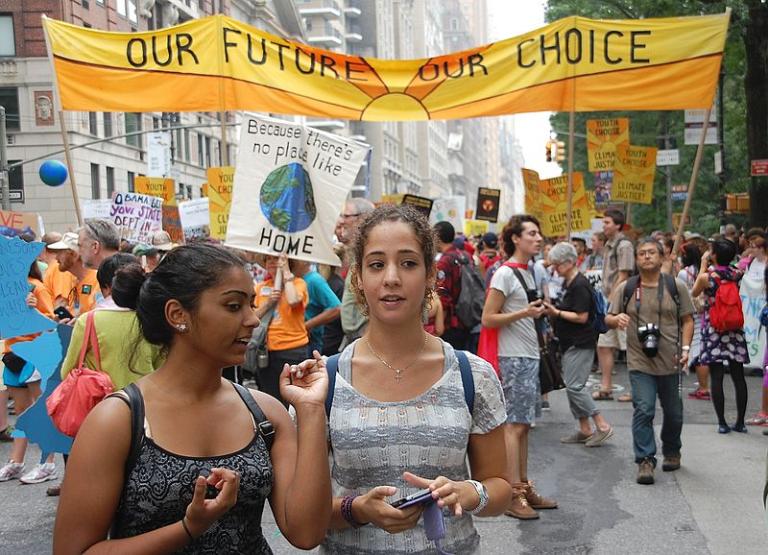 [Friends, this post came out in an altered form at World magazine last week. It was toned down in a way that suggested we might indeed face a climate catastrophe, which is the opposite of what I wrote. Thus this original version.]
[Friends, this post came out in an altered form at World magazine last week. It was toned down in a way that suggested we might indeed face a climate catastrophe, which is the opposite of what I wrote. Thus this original version.]
Pope Francis warns that we face a global “climate emergency.” In his opening address to students in September, the president of Harvard University said climate change is “the most consequential threat facing humanity.”
Climate catastrophists like Francis and Harvard’s president make frightening claims: global warming from carbon dioxide emissions will make millions homeless because rising sea levels will drown whole cities, and higher temperatures are killing people with unprecedented heat waves, hurricanes, flooding, fires, and drought. The extreme weather is said to come from carbon emissions produced by human beings, mostly from fossil fuels. Only a speedy transition from oil and natural gas to renewable energy like solar and wind will save the planet and, in return, the human race.
Are the climate doomsayers correct?
In a word, no. There are plenty of reasons to question these claims. There are also good reasons to conclude that that millions of poor people will die needlessly if climate change policies are pursued without considering the real needs of poor nations. That should concern everyone, especially Christians.
Global warming is a fact, but we do not face a climate catastrophe. The United Nations Intergovernmental Panel for Climate Change (IPCC) reported in August that disastrous outcomes of global warming are “very unlikely.” It even conceded that the dire emissions scenario it promoted for two decades is “highly unlikely.”
The science supports this downgrading from catastrophe to chronic problem. As President Obama’s top energy scientist Stephen Koonin has reported in his book Unsettled, the global temperature has gone up only one degree Celsius since the late 1800s, and more warming does not constitute a catastrophe. “Since human well-being has improved spectacularly, even as the globe warmed during the 20th century, it is absurd to suggest that an additional degree of warming over the next century will be catastrophic.”
The new IPCC report shows that heat waves are no more common today than they were in 1900. Although a U.S. government report claimed that this past July was the hottest on record, the report’s margin of error was ten times as large as the claimed difference over the previous hottest claim for July 2016.
Cold weather kills far more people than hot. A 2015 study in the Lancet showed that while heat caused .5% of all deaths, cold claimed 7%. Higher temperatures mean that fewer will die from cold.
The IPCC report for 2019 states that there has been no increase in flooding overall and globally over the last century.
The same can be said for fires. Satellites have demonstrated a 25% reduction globally in burned areas over the last 18 years. Because the number of homes built in high-fire-risk zones in the American West has skyrocketed, we get the mistaken impression that fires globally have also zoomed up.
The same is true for hurricanes. The IPCC report for 2013 concluded that these destructive storms are not getting more frequent but in fact are declining slightly.
Overall, extreme weather is not causing more damage to human life. The world’s best database in Belgium shows that deaths from climate-related catastrophes have plummeted by 96% over the past century, mostly because of adaptations that people have made.
Many will be surprised to learn that a transition from oil and gas to solar and wind and electric cars is dirty and almost useless, and will hurt the poor. Extraction of oil and gases leaves a comparatively light footprint on the ground, but the production of electric cars requires big-footprint mines and chemical processing that pollutes. Electric cars emit only 24% less CO2 than gas-fueled, and just as many dangerous air-pollution particulates.
The best-kept secret of this massive energy transformation is that it won’t help global warming in any significant way. Using UN estimates, even if the Paris Agreement were extended to 2100 and all its signers fulfilled their commitments (highly unlikely), the global temperature rise would be reduced by only four-tenths of one degree Fahrenheit. As Danish climate expert Bjorn Lomborg concludes, spending trillions of dollars to achieve almost nothing is a bad thing.
Besides, it hurts the poor, who need cheap energy to get out of poverty. Climate change policy subsidizes solar panels and Teslas for the wealthy but raises energy prices to levels the poor cannot afford. The result, according to Lomborg, is that the Paris agreement is projected to keep 11 million more people in poverty by 2030 than otherwise would be. If in November the Glasgow climate conference enacts more stringent regulations, 80 million additional people will die of malnutrition.
What should Christians do? Lomborg and other climate scientists suggest we support innovation in cheaper green energy such as fusion, fission, water splitting, and—yes—nuclear which, as the French have found, is clean, cheap, and safe.
Christians are called to be stewards of creation. We should love the world because, well, God loves the world. To express doubt about climate catastrophism does not absolve of us our responsibility to care for our creation or to find ever-more creative energy alternatives for a sustainable future.










